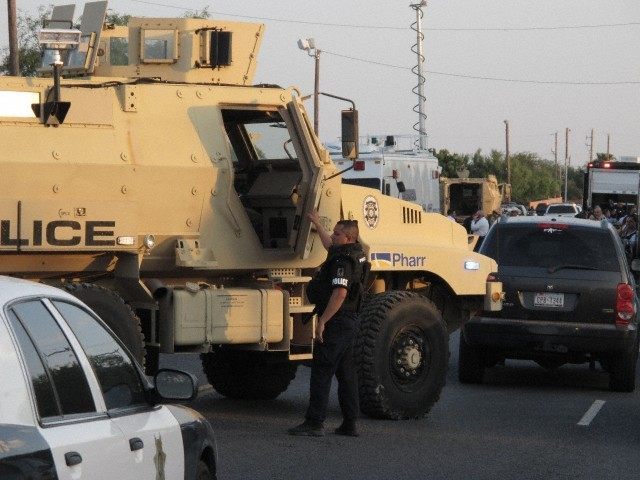On May 18, Administration officials announced President Obama will ban the federal provision of some types of military-style equipment to local police departments, and sharply restrict the availability of others. According to the New York Times, the ban is part of his push to ease tensions between law enforcement and minority communities after the crises in Baltimore, Ferguson, and other cities. Unfortunately, his across-the-board peace-making slash isn’t taking account of the cartel war faced by local police departments on the southwest border every day.
The buzzword of choice these days for open-borders advocates and anti-police activists is militarization – of our southwest border, larger cities, and small communities. This is understandable, as the equipment being used by some police departments clearly falls under the category of military-grade: armored personnel carriers, ballistic vests, high-powered rifles, and night vision goggles. The sight of a large group of police officers in full riot gear getting ready to face off with an angry mob can be pretty intimidating.
However, the problem is that Obama is placing the blame for the mistrust between police and minority communities on the intimidation factor of the equipment and vehicles, rather than the human relationships – or lack thereof – between the officers and community residents. As a result of this knee-jerk reaction and idealistic crusade, which he believes will actually placate angry minorities, many police officers will go unprotected from aggressors better armed and protected than they are. Nowhere is this disparity more evident than along the US-Mexico border.
The worst gang neighborhoods in Los Angeles, Chicago, and Detroit are veritable war zones at times. But gang members are known to police, their tactics familiar, and whereabouts usually local. In places like Brownsville, TX, or Nogales, AZ, local police officers and sheriffs’ deputies are the first line of defense against armed and deadly drug smugglers – most of whom work directly for brutally violent Mexican cartels – who manage to sneak past Border Patrol agents. Most smaller border communities are poor, and their law enforcement agencies rely heavily on federal grants, such as Operation Stonegarden funds, to help pay for much-needed equipment and officer overtime related to the border security mission. Without federal help to buy the protective gear and firearms needed to effectively confront these no-holds-barred criminal thugs, these officers are essentially bringing knives to a gunfight.
What President Obama fails to understand is that these officers are facing a foreign enemy with unlimited funding, as well-armed and equipped as any conventional army or special operations unit. Border Patrol Agent Brian Terry was murdered by a Mexican rip crew in southern Arizona in December 2010, despite his entire BORTAC team having military-style weapons and ballistic gear. What would have become of local sheriffs’ deputies under Obama’s equipment ban if these border bandits had not been apprehended or driven back into Mexico, but instead continued to head north?
It is short-sighted and naïve to presume that softening the look of police officers in crowd-control scenarios will automatically calm down an angry mob, or soften the attitude of a bitter community towards its police department. It’s also irresponsible to implement a general cut on crucial equipment designed to protect officers in the most dangerous situations, without taking into account the unique needs of agencies in certain regions of the country.
Once again, Obama tries to be the “nice guy” – except this time at home with minority communities, instead of foreign tyrant dictators. In the meantime, he fails to address the very real and disturbing concerns of these cities and towns, endangering the men and women committed to protecting them.
Sylvia Longmire is a border security expert and Contributing Editor for Breitbart Texas. You can read more about cross-border issues in her latest book, Border Insecurity: Why Big Money, Fences, and Drones Aren’t Making Us Safer.

COMMENTS
Please let us know if you're having issues with commenting.